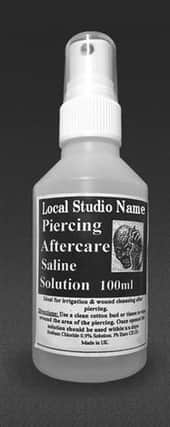Infection warning over piercing aftercare spray


The saline solution, manufactured by Lion Care Products Ltd, has been linked to 26 cases of Pseudomonas aeruginosa.
The bacteria can lead to pneumonia, extensive tissue damage or even septic shock in vulnerable people whose immune systems are weakened.
Advertisement
Hide AdAdvertisement
Hide AdSo far to date all the infections have been ear infections, with most occurring in the East Midlands and the South East.
But the product, which comes in a 100ml bottle, has been distributed to piercing studios across England so more cases are likely. It is also available in Scotland. Monitoring will continue for further cases.
Dr Richard Puleston, consultant at Public Health England (PHE), said: “Infection is not uncommon following piercings, but the particular type of bacteria linked to this outbreak can cause severe infection.
“It is important people take extra care in ensuring any piercing is properly cleansed and to follow professional advice available from local environmental health teams.
Advertisement
Hide AdAdvertisement
Hide Ad“If people are concerned about possible infection they are strongly advised to seek medical attention urgently.”
The cases have occurred in people where piercings were undertaken between mid July and late August 2016. But there may be other more recent cases which have not yet been reported.
There is no consistent brand or label being used on the product. Some labels, using only black and white lettering, will have the manufacturer’s trading name, Body Art Supplies, or may carry the Lion Care name.
Other studios’ labels may use their own name or brand on the label. If unsure, people should stop using the spray immediately and return it to their local studio.
Advertisement
Hide AdAdvertisement
Hide AdPHE advice on aftercare following body piercings is to follow the guidelines provided on the Chartered Institute of Environmental Health website.
This includes having clean hands when checking the pierced site and soaking the piercing for a few minutes in a clean bowl of salted warm water.
It is also possible to use mild antibacterial solutions and soaps to wash the wound site of an ear piercing.
After cleansing the piercing should be dried using a fresh disposable towel or kitchen roll. It is expected some swelling and soreness from new piercings may occur.
Advertisement
Hide AdAdvertisement
Hide AdPHE is continuing to investigate, and is liaising with the appropriate authorities to ensure the contaminated product is removed from piercing studios and wherever possible clients are contacted and advised to cease using the product.